Episode Three: Journey to Charleston
First, a quick review from Julia’s mom …
Episode One: When a Book Report is Not Just a Book Report
This story begins in December 2006, with an ordinary fifth grade book report assignment. Jodi Sohl, Julia’s general studies teacher at the Hebrew Day School, assigned a biography book report. She had the students choose from a long list of names, some more well known than others. At the top were nine names of Jewish Americans whose contributions were significant but now forgotten. Extra points for choosing one of those names. Julia considered the list carefully, pointing to each of the extra credit names. “Penina Moise. Who is that?” asked Julia. “I don’t know,” I said. “Good. ” says Julia. “We’ll do her.”
Then we figured out there were no books in print about her. Google book search had a few chapters of public domain material from 100 years ago. Julia spent hours with excerpts from the American Jewish Yearbook from 1905, writing facts on index cards. What did Julia find out?
Penina Moise was born in Charleston, South Carolina in 1797 to Abraham and Sarah Moise. Fatherless at 12, no longer able to attend school, she persisted in her dream to become a published writer. She was the first American Jew to publish a book of poetry, Fancy’s Sketchbook in 1833. She wrote widely on religious and political subjects, helped raise the funds to rebuild Kahal Kadosh Beth Elohim, her synagogue, after it was destroyed in a fire. She taught school, nursed her mother for years in her final illness, nursed many people during the yellow fever epidemic of 1854, went blind shortly after, yet continued to write and teach until shortly before her death in 1880. She never married. Her suitors were non-Jews, and she would not intermarry.
Eventually, Julia produced a book report (and got an “A”). She did a wax museum presentation on Penina Moise for her class and the first and third grades, reciting excerpts from her report and a brief essay by Penina Moise.
Episode Two: Julia Gets an Idea
Julia was becoming concerned that no one seemed to know who Penina Moise was. In May 2007, Julia had an opportunity to do a little public education. She and I participated in the Makom mother-daughter learning program at Ohev Shalom Talmud Torah on 16th Street in Washington, D.C. Aliza Sperling, the teacher, encouraged Julia to give a dvar Torah at the spring shabbaton. Julia chose the life of Penina Moise as her subject. She went through Pirke Avot and drew parallels between the mishnayot and Penina Moise’s dedication to study and learning despite terrible hardships. Julia also made an illustrated timeline poster to use during her speech. She was supposed to speak just once, at seudah shlishit. Then Rabbi Shmuel Herzfeld asked Julia to speak at the dinner, in the ballroom, to a crowd of more than 80 people. She agreed. I repeated for her, but she came across very well. So well that she was asked to give the speech again at seudah shlishit. At both speeches, only one person had heard of Penina Moise before, someone who turned out to be from South Carolina.
On the way home in the car, in the pouring rain, stuck in traffic in downtown Silver Spring, Julia pondered why no one seemed to know about this great and pioneering woman. I asked her how someone would find out about her. Eventually, Julia said, “A book.” “But remember, there are no books about her, at least not in print.” And then, from the back seat: “I will write a book about Penina Moise.” She described her ideal bat mitzvah as a pizza party and book signing, where she would autograph her book about Penina Moise for the guests. “And how are you going to do this?” I asked. “Mommy, you have to take me to Charleston.”
Which Brings us Back to: Episode Three
I made contacts with archivist Eve Cassat and Professor Dale Rosengarten at the College of Charleston. Eve sent Julia a wonderful packet of material. We contacted historical societies and tried to get into a convention (that didn’t work). Eventually, it looked like we might be able to get to Charleston in April, right before Pesach. No sooner than I made the hotel reservations, Barrie, our eight year old, had a playground accident that loosened a few teeth. The x-rays looked good, so we started packing. Then literally, on the way out of town on Sunday, we detoured to Rockville for throat cultures because Barrie and David had sore throats. Julia and Barrie both had strep. After some chewable Augmentin and the promise of Mary Poppins on the portable DVD player, we got on the road about 4:30 p.m., arriving in Charleston a little after 2:00 a.m. Most interesting thing on the trip down: the moosehead tied to a top of an SUV just north of Richmond.
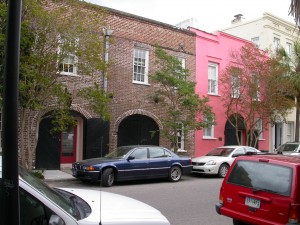 Today, we still managed to do the first third of a walking tour designed by Anita Moise Rosenberg, the great-nice of Penina Moise, showing the houses and businesses connected to the Moise family. We toured the Footlights Theater and saw a mural featuring Isaac Harby, a relative of Penina Moise who wrote plays in the early 1800s.
Today, we still managed to do the first third of a walking tour designed by Anita Moise Rosenberg, the great-nice of Penina Moise, showing the houses and businesses connected to the Moise family. We toured the Footlights Theater and saw a mural featuring Isaac Harby, a relative of Penina Moise who wrote plays in the early 1800s. 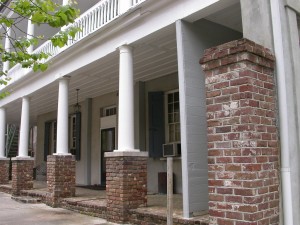 Then we walked down Queen Street to Number 46, where Penina’s parents lived with their first six children. In the afternoon, we spent a wonderful hour with Professor Rosengarten at the Addlestone Library, looking at archival materials, newly discovered poems by Penina Moise and discussing Julia’s questions.
Then we walked down Queen Street to Number 46, where Penina’s parents lived with their first six children. In the afternoon, we spent a wonderful hour with Professor Rosengarten at the Addlestone Library, looking at archival materials, newly discovered poems by Penina Moise and discussing Julia’s questions. 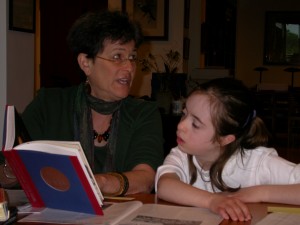 Prof. Rosengarten gave Julia many newsletters and magazines featuring Penina Moise to take home to assist in further research.
Prof. Rosengarten gave Julia many newsletters and magazines featuring Penina Moise to take home to assist in further research.
We had dinner at Pita King, then drove around the historic district down to the water front. Lots more planned for tomorrow.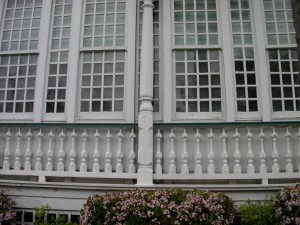
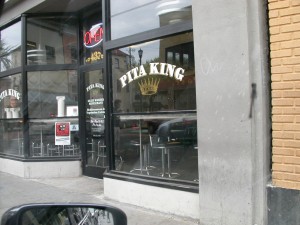
Way to go, Julia! We wish you lots of luck on your quest!
XOXO
-Anti-Marna and the Bunny Man
Julia,
This is such a great blog. I have learned so much about Penina Moise from you. I can’t wait to read your book!
— Aliza
Julia, I think it is wonderful that you are exploring Penina’s life. I am related to her through my Grandmother-Susan Elizabeth Moise. Her Great-Grandfather was Aaron Moise and he was Penina’s brother. He was born in Santo Domingo. Our family has a family history book that you might be interested in. Possibly some of my distant cousins in Charleston have told you this. I have not visited any of my relatives in Charleston but I do have 1st cousins that have done so. Good luck in your quest for information and enjoy Penina’s beautiful poems.
Shelly Jacobs Williams